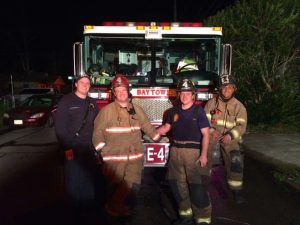Patrick Mahoney, a 16-year veteran with the Baytown, TX fire department, says the city’s decision to challenge his workers’ compensation claim is a “slap in the face.” Mahoney, a battalion chief, was diagnosed with thyroid cancer in 2016. Under Texas law, if a firefighter develops cancer it is presumed to be from workplace hazards. The city doesn’t think the law applies to them.

The City of Baytown self-insures. They denied the firefighter’s initial claim, but Mahoney appealed to the state’s adjudicator of disputed workers’ compensation claims. The firefighter prevailed against the city not just once, but twice.
The state’s Division of Workers’ Compensation ordered Baytown to pay Mahoney for lost wages and medical expenses. Instead of making things right with their firefighter, the city has now filed a lawsuit against Mahoney. They are asking a state district court to throw out the decision by the Division of Workers’ Compensation.
I initially read about Mahoney’s situation in a story by Nick Powell with the Houston Chronicle. It comes just a few days after I wrote about a new law that will establish a national Firefighter Cancer Registry.
We should all be offended by Baytown’s lawsuit. Don’t abuse a firefighter with cancer and deny his request for the financial protection provided by workers’ compensation. The City of Baytown’s decision is an insult to the firefighters in my town and in your’s.
There are logical reasons for cancer to be a covered occupational disease for firefighters. Here are some of them:
- Firefighters are exposed to dozens of carcinogens in the course of their employment. This includes asbestos, polycyclic aromatic hydrocarbons, benzene, and fluorinated fire suppression chemicals.
- Their exposure to carcinogens doesn’t happen one toxin at a time—they are exposed to a mixture of carcinogens. We know very little about the synergistic effects of mixed chemical exposures.
- Not only is there very little data on the effects of mixed exposure to carcinogens, we don’t know how other exposures experienced by firefighters might trigger or amplify those effects. For example, firefighters are exposed to excessive heat, noise, and stress.
- The vast majority of research dollars are spent on developing new cancer treatments. Treatments are important, but too few dollars are invested looking upstream to prevent cancer. Very few research dollars are devoted to identifying the occupational and environmental exposures that are associated with cancer.
- Many individuals develop cancer (including myself) although we do not have the commonly known risk factors. There is an very incomplete complete picture of the exposures that cause cancer. Some of us may also have cellular features that makes us more susceptible to DNA damage from carcinogens. That’s why prevention is so important.
- It’s impossible to pinpoint the exact factors that caused any one individual’s cancer. Epidemiological studies tell us, however, that firefighters have a significantly higher incidence of cancer than the general population. There are obviously hazards — some known, others not—in their work that are associated with cancer.
- Finally, epidemiological studies take a very, very conservative approach when making statistical conclusions. By convention, epidemiological analyses test for 95 percent confidence in the results. This ends up giving the benefit of the doubt to a chemical. It also means we expect 95 percent confidence to say an occupation has an elevate risk of a particularly disease, such as thyroid cancer.
Firefighter Patrick Mahoney has thyroid cancer. The expert hired by the City of Baytown testified that thyroid cancer should not be considered an occupational disease. She argued that thyroid cancer is associated with exposure to radiation and therefore Mahoney’s disease was not work-related. There’s no reason to think, however, that radiation is the only risk factor for thyroid cancer. It’s just the one that’s been extensively studied, in part, because of man-made disasters during World War II and Chernobyl. Plenty of people, however, develop thyroid cancer who were not exposed to radiation. I think it is completely reasonable to consider Mr. Mahoney’s occupational exposure to carcinogens as a potential cause or contributor to his thyroid cancer.
Firefighter Mahoney has the support of his sisters and brothers in the fire service. The President of the Texas State Association of Fire Fighters wrote to Baytown Mayor Stephen DonCarlos and City Manager Rick Davis, calling on them to immediately reverse course.
“We urge the City of Baytown to end its costly, taxpayer-funded litigation against cancer-stricken Baytown firefighter Patrick Mahoney.”
They added,
“At a time when the City of Baytown is recruiting firefighters from other Texas communities, this senseless litigation against Mr. Mahoney sends the wrong message to current and prospective firefighter hires as well as to city taxpayers. We believe the law is clear: as a Baytown firefighter, Mr. Mahoney has earned insurance coverage for medical treatment of his cancer.”
I couldn’t agree more.

The city of Baytown sucks seems they think they can do whatever they want to people and we have to bow down and take it wrong! I pray this firefighter gets what is truly his